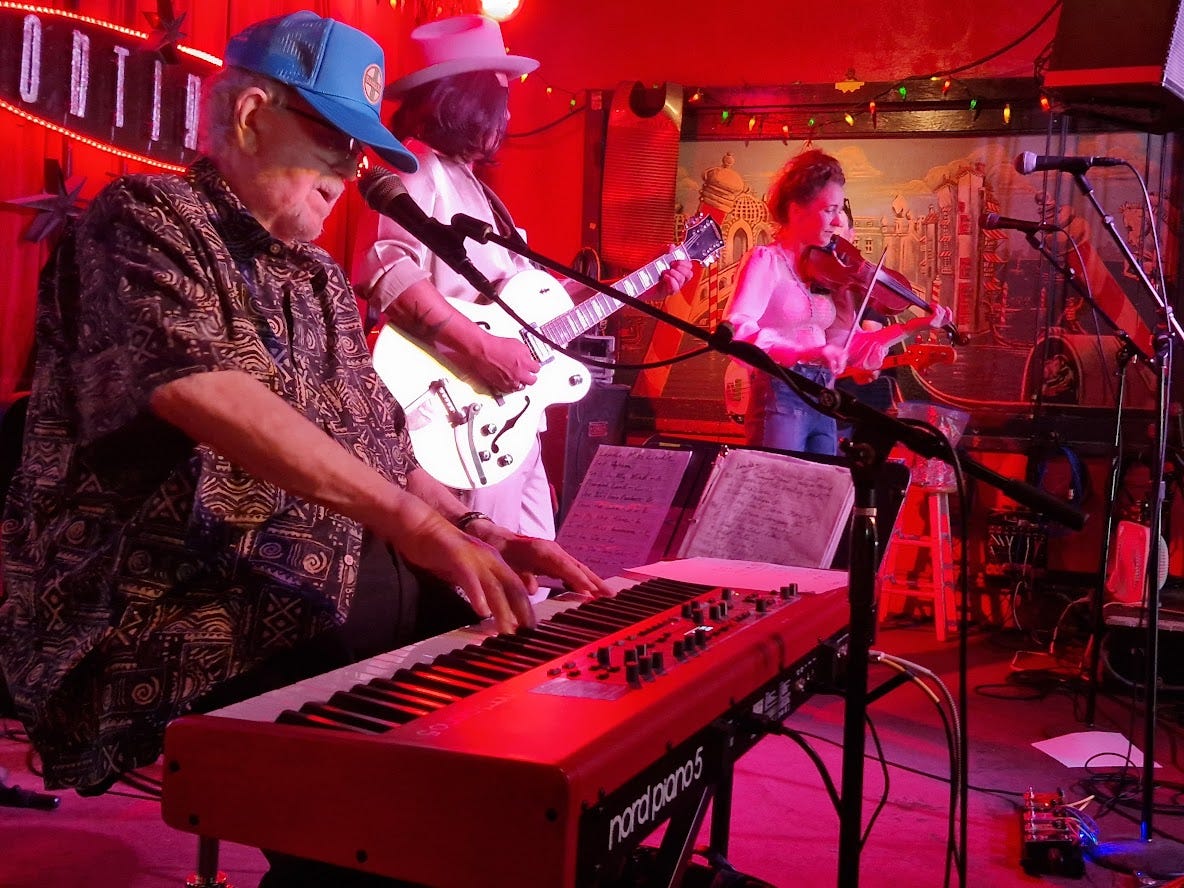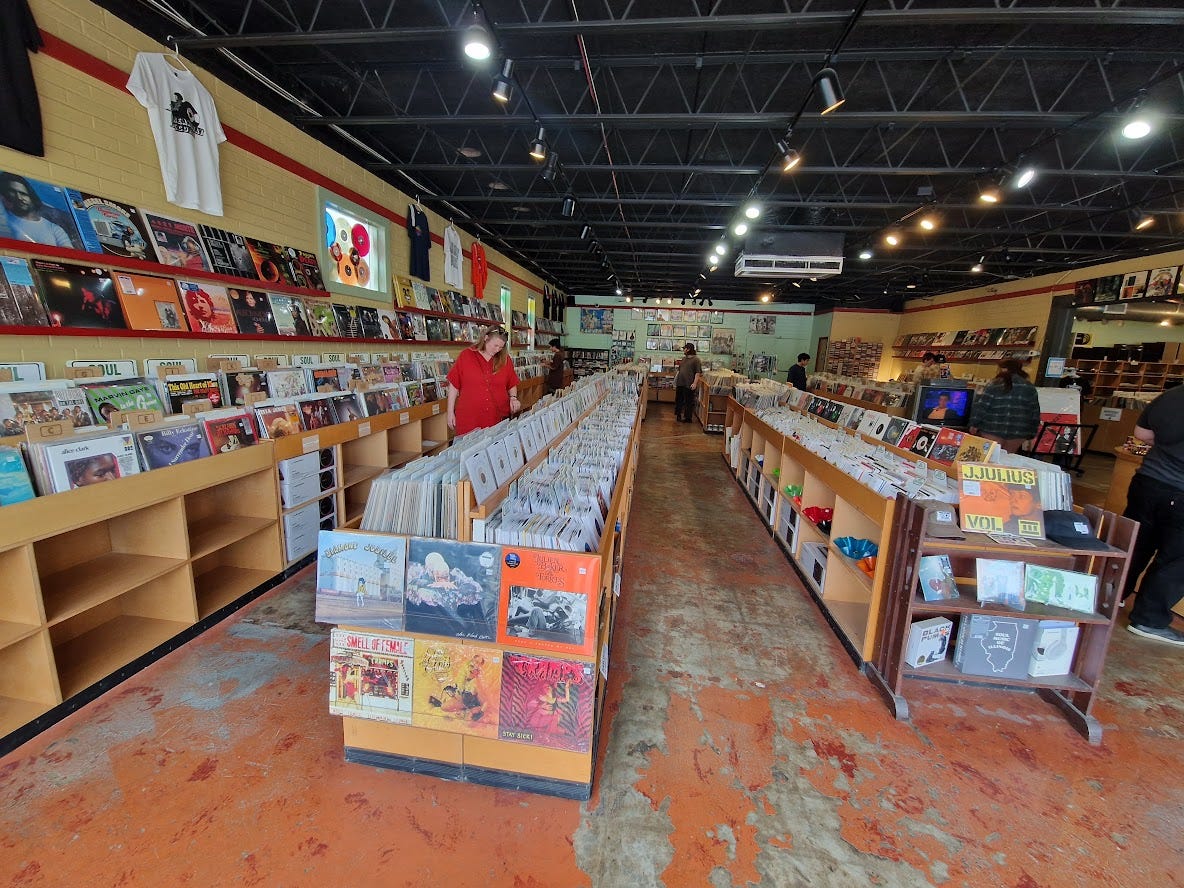Once upon a time Willie Nelson was Austin’s reigning counter-culture king.
I spent last weekend in Texas. Having not set foot in the lone star state since 2013 it was a pleasure to return, especially as I stayed with my Austin pals Melissa and Shaun – Melissa lived in London for several years and, when she and Shaun visited the Smoke in March, I mentioned I might be heading to New Orleans. “Then you have to come to Austin,” she said. I’m certainly pleased I did.
That said, when I rang Melissa from New Orleans to let her know my flight details she said, “I have to warn you – Austin’s changed.” No doubt, everywhere changes – my patch of London is undergoing a huge transition as tower blocks are built down and around the Old Kent Road – but I understood what Melissa meant: Austin, once one of the USA’s foremost music cities, is now a tech hub. This means the population has swelled, rents have risen and the funky, loose vibe that once characterised parts of downtown has passed.
I’m sure in 2013 the change was underway – even then I recall T-shirts that stated “Keep Austin Weird” being worn as emblems of the old Austin – but now the Austin Chronicle, one of the few surviving ‘alternative’ culture free weekly US newspapers, now sells a T-shirt listing all the venues/bars/restaurants that once existed “when Austin was weird”.
Its more than half a century ago that the likes of Willie Nelson and Waylon Jennings, both native Texans, chose Austin as the city they wanted to hang their hats in, tired as they were of Nashville, a city noted both for its conservative music industry and being “the buckle on the Bible belt”. Nelson’s beatific music and manner helped unify hippies with rednecks and, for a good while, Austin was home to remarkable creative energies. From Guy Clark and Stevie Ray Vaughan, through the essayist/art dealer Dave Hickey and the film director Richard Linklater – to name a handful of the city’s most iconic sons (someone please knowledge me as to its daughters) – Austin was a metropolis that shaped creatives who took imaginatively individual approaches to their mediums.
These days, well Linklater still lives here and has long been my favourite contemporary US film director - his films have a warmth, wit and humanity the likes of Scorsese/Lynch/Coppola/Tarantino/Lee/Jarmusch etc lack, no matter how big their budgets or high flying their ambitions - and I’m sure his presence here lifts other creatives.
Unfortunately, musically things have long been in decline. I first came here in 2005 to research More Miles Than Money, my book on US vernacular music. Back then both Alejandro Escovedo and Dale Watson, while veterans (of sorts), played out regularly and you could still imagine there being something of a scene here. Not any more. Well, Watson still works the local bars but his best days are long behind him. And the East Nashville scene has siphoned off the young Americana talent.
Earle Poole Ball and band: the honky tonk blues…
Case in point: heading to the Continental Club on Saturday afternoon – one of Austin’s last holdouts for honky tonk music – we caught Earl Poole Ball, a veteran pianist who started out playing on rockabilly recordings in the late-1950s and has since played on literally hundreds of country sessions in Nashville and Los Angeles, before relocating to Austin. Unfortunately, Earl is not much of a band leader or vocalist - the four youngish musicians he had in his band never rose above ‘average’, while Earl’s refrains about playing with Gram Parsons does not mean he and his outfit then performed a song that matched Gram’s beautifully light touch. Last time I set foot in the Continental it was to see Fender Stratocaster master Redd Volkaert perform and, while sharing with Earl a reputation for excelling on sessions, he led a superior band. Red’s since joined the exodus of musical talent out of Austin.
More enjoyable - and also a remanent of old Austin - was Esther’s Follies, a high energy, risk taking, vaudeville show mixing comedy, music and magic, on 6th Street. Esther’s Follies has existed for almost 50 years and remains as irreverent as ever ( if some of the local jokes passed me by I still enjoyed the evening). The surrounding bars on 6th Street are heaving on a Saturday night but none of them feature live music, all focusing on DJs or sports. Melissa recalled a time when these same bars all featured Stevie Ray imitators, which just goes to show how whatever is currently popular gets to define the mating rites of Saturday night.
If Austin’s now lacking in exciting live music, it remains a hub for excellent Mexican food and Melissa insisted we dined at Pulvo’s - here they not only serve up delicious Mexican dishes but the best frozen margarita I’ve ever tasted. So good!
Austin is also a record shop hub - the city is home to at least half a dozen such shops and Melissa kindly drove me to a selection of them (in New Orleans I only made it to Domino Sound Shack due to relying on buses/Ubers - they are spread far across that small city). First and best was Breakaway Records - this is a large store with some new but largely used stock. And what stock - I could have dropped a small fortune here! They even had a sealed copy of Heed The Call - the superb compilation of Kiwi soul/funk/disco from the 1970s! Best of all, for a crate digger who loves old R&B 45s, they had loads of great stock priced at $1 each. I had to restrain myself from going on a crazy spree!
Breakaway Records: just imagine the hours of your life you could lose here (and this is only part of the emporium!).
We then visited Antone’s Record Shop. Also a good sized shop - bigger than most in the UK - and once connected to Antone’s, Austin’s most celebrated blues venue (Melissa informed me that Antone’s now books all kinds of music; the heyday of Austin blues being long gone). Their stock was predominantly used, loads of LPs and a racks of 45s - here I satisfied my New Orleans’ passions with Irma Thomas’ A Good Man (her second 45 on Ric from 1959) and Huey ‘Piano’ Smith’s Free, Single & Disengaged on Ace (for the combined price of $7 + tax).
Waterloo Records is Austin’s largest and best known record shop. Its stock is largely new and there is lots of stereo and DJ equipment and T-shirts etc. Their 45 selection was small but I did find Nathaniel Mayer’s Village Of Love (on Fortune - a Detroit







